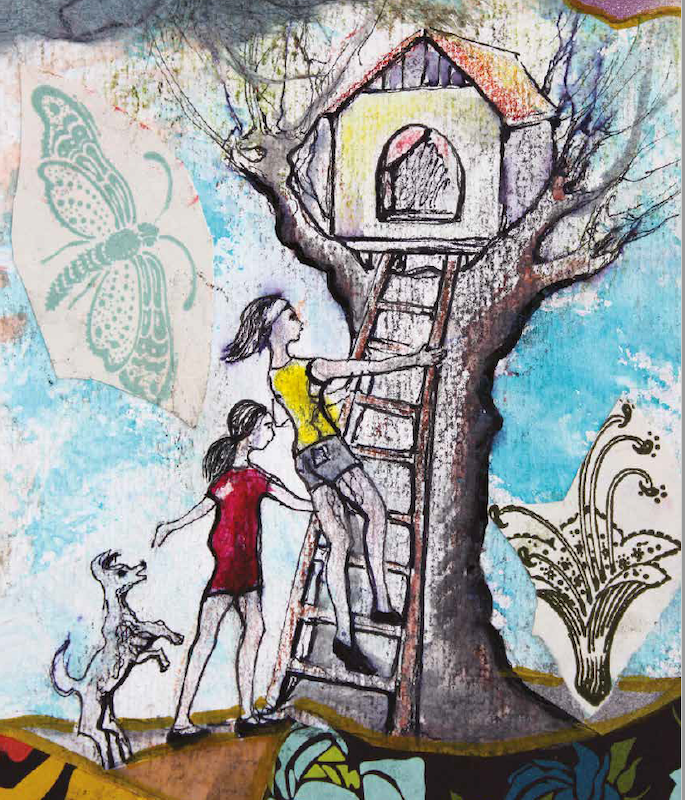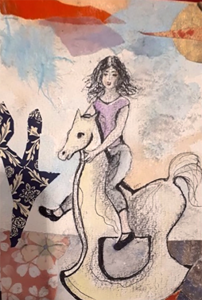Old Games in Nursery Rhymes

The Tree House
From the house on the tree
Watch the world below,
There’s more than you see,
Much more than you know.
Drawings: Fiorenza Bucciarelli – Text: Elena Slawinska – Music: Leo Blank (Sweden)
Ciuciubabka is Polish for “blind man’s buff”. This is the title of a delightful book of nursery rhymes written first in Italian, then translated and reinterpreted into three languages: English, French and Polish.
The perfect title for a project that was to some extent born “blind”. The authors gathered their inspiration as they went along, drawing on their great enthusiasm and passion for games, music, art and poetry, in an original combination. A helping hand came from the period in which they wrote, when time was standing still and we were all immersed in a deafening silence.
As the introduction tells us, it was April 2020. We were in the middle of the Covid-19 world lockdown. Imprisoned in our homes, we sat at our windows, watching the sudden, almost insolent budding of nature, spurred on by the touches of summery weather. Who will ever forget those days?
Wanting to Play
Fiorenza Bucciarelli, a piano teacher at the Conservatorio of Alessandria and the creator of the drawings for the book, suddenly wanted to play games, as so many of us did. She remembered when she was a little girl. What fun it was to play ball in the courtyard, to dash around on the skateboard or to skip the rope to the rhythm of a sort of song: “orange …kiwi … lemon … mandarin…” Such simple things, those games, we took them for granted. Now that we were denied them, they took on an almost vital significance. Fiorenza’s first granddaughter was on the way. She listened to Bizet and wondered what sort of a world the child would be growing up in. She started to draw, thinking back to her old games with her friends. The result was 21 little pictures inspired by games that the new digitally-born generation would describe as “prehistoric”. Her games. Our games. Many have survived the passing of time: ball, roller-skates, the tree house.
Fiorenza wrote to Elena Slawinska, an architect, but also a researcher and translator. Elena had been a valuable collaborator with Galactus Translations during our research into the military life of an Italian soldier in Greece, the grandfather of one of our clients (See The cabinet of shame). Elena was in Canada, on an island under strict curfew for the pandemic. She wrote, she translated, she tried not to think about what was happening around her. Writing and translating kept her mind busy. Fiorenza sent her the sketches and asked if she could write a nursery rhyme in Italian for each of the games illustrated in her pictures: the swing, the hula hoop, the skateboard, the toy train, the roller-skates… And more. Fiorenza asked Elena if she could translate the texts into other languages.
Translation into three languages
After some hesitation, Elena tried to compose some rhymed verses on the games illustrated in Fiorenza’s pictures. Thus was born the first nursery rhyme, of four lines, in Italian, followed by the versions in French and English. Elena got the bug. It was entertaining. A breath of lightheartedness in a period of gloom. She therefore roped her husband in, too, a full professor of mathematics and physics, the author of numerous scientific publications, but also a nut for history, literature and much else. Michael Slawinski was nothing loth. He took up the challenge and, between one equation and the next, interpreted and translated the Italian nursery rhymes into his native Polish. As the authors themselves point out, the English, French and Polish versions are not exactly mirror translations of the Italian text. Rather, they are interpretations, taking their inspiration from the Italian, but also taking into account the cultural differences.
After the translation came the music
It didn’t stop there. After the images and the text, Fiorenza decided to match each nursery rhyme with music. Musicians from various countries of the world were invited to compose short pieces specifically designed to accompany the reading of each nursery rhyme. The project became multidisciplinary and multicultural, as well as multilingual.
The publisher Sillabe liked the idea and issued the nursery rhymes in Italian with the versions in French, English and Polish, together with back translations into Italian. Ciuciubabka is a beautiful little book with coloured illustrations. Each page has a QR-code that can be used to listen to the music while you read the nursery rhyme in your chosen language. The reader may be a child, but may also be an adult. Just wanting to play.


 William Congdon Foundation
William Congdon Foundation